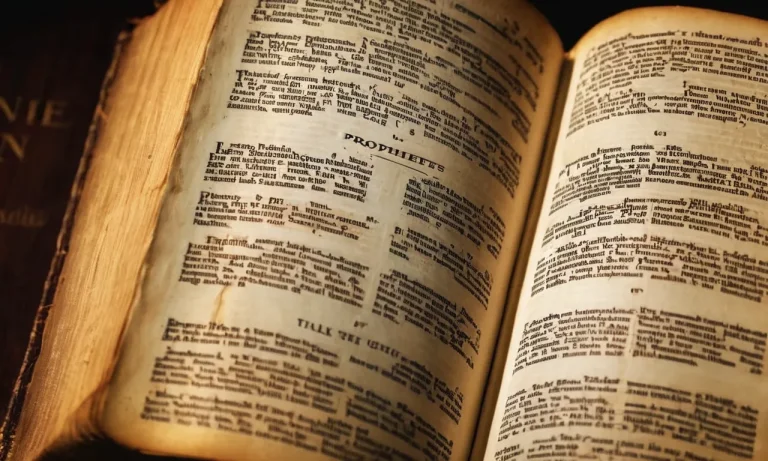Why Doesn’T God Stop Evil?
The presence of evil and suffering is one of the most common reasons people doubt God’s existence or goodness. If God is all-powerful and all-good, why does He allow so much pain and injustice in the world?
If you’re short on time, here’s a quick answer to your question: God allows evil because He gave us free will, which means the ability to choose between good and evil. Stopping all evil would require eliminating free will.
However, free will is valuable because it allows us to freely love, trust and obey God.
In this comprehensive article, we will examine the complex question of why God allows evil to exist despite being omnipotent and perfectly good. We will look at the origin of evil, free will, natural evil, the greater good, redemption, and how to respond to evil and suffering.
The Origin of Evil
Evil as Parasitic
Many philosophical and religious traditions view evil as something that is parasitic on the good. Evil is often seen as a distortion, corruption, or privation of the good rather than something that exists in its own right. As the philosopher Augustine put it, evil is like a “twisted splendor.”
On this view, evil requires good in order to exist at all. Goodness or being is the fundamental reality, while evil is a departure from, rejection of, or rebellion against the good. Evil corrupts, distorts, twists, or wounds the good creation but does not have any independent reality of its own.
An analogy sometimes used is health and disease. Disease has no independent reality but depends on health for its existence. Similarly, evil has no independent substance but exists as a distortion or infection of the good.
The Gift of Free Will
Many faith traditions also see human free will as an important explanation for why God allows evil. Free will means that humans can make meaningful choices, including the choice whether or not to love and obey God. But free will also means the capacity to choose evil and rebellion against God.
As difficult as it is for us to comprehend, God created people with free will because authentic love and goodness require the real possibility of choosing otherwise. Without genuine freedom, obedience and worship would be meaningless, forced, robotic. Love and goodness require freedom.
But freedom also allows the choice of evil. This leads to enormous pain, suffering, and destruction in the world. God could eliminate all evil by eliminating human freedom. But God highly values authentic relationship and love, which means God had to make space for the risk and the tragedy of evil.
This is still an immense mystery. But valuing love and freedom so highly is perhaps part of the reason God does not simply eliminate all evil from the world by force.
Natural Evil
Natural Disasters
Natural disasters like earthquakes, floods, and hurricanes are a type of evil that God does not directly cause but allows to occur. These natural phenomena are a result of the natural laws and processes that God set up at the creation of the world.
For example, tectonic plate movements cause earthquakes and climate patterns like El Niño lead to severe weather events. God created natural laws to govern the universe and did not want to override these laws every time a potential natural disaster loomed.
Constant divine intervention against nature would make for an inconsistent and chaotic world.
However, some question why God does not at least curb the destructiveness of natural disasters. They kill thousands of people every year and leave many more injured, grieving, and displaced. Surely an all-powerful God could alter the weather just enough to protect populated areas while still allowing the natural forces to play out elsewhere.
While we cannot claim to know the full reasons, possible explanations include:
- To allow consequences for human choices: Many disasters strike populated areas because people chose to build there, such as along major fault lines or vulnerable coastlines.
- To stir compassion in humanity: Images of disasters motivate generosity, aid, and heroic efforts between peoples.
- To remind us of our limits: No human system can completely prevent disasters, directing us to seek God rather than trusting in our ingenuity.
Ultimately, we have faith that God permits natural disasters for wise and good purposes, even if we do not understand them all. His heart breaks along with ours for those who suffer loss.
Disease and Illness
Diseases and illnesses are another type of “natural evil” that God allows rather than directly causes. Cancer, malaria, COVID-19 and other diseases arise from natural processes, though their effects often feel far from natural.
Like natural disasters, disease processes were indirectly set up by God in the creation of a complex and interconnected natural world.
From the wreckage of disease, the question arises – if God is good, why does He allow so much human suffering at the microbial level? Though an ultimate answer eludes us, we can glean some insight:
- They highlight our fragility: Disease is an inescapable reminder that despite our technologies, we have very limited control over our health and lives. Our days are numbered.
- They elicit compassion: Tireless efforts to fight diseases have brought us some of our most selfless human endeavors. Think medical workers, researchers, and philanthropists.
- They turn us to God: Facing our mortality drives us to grapple with deeper questions about meaning, eternity, and our Creator.
While disease causes unfathomable suffering, its presence in a fallen, imperfect world points us to trust in an all-powerful and loving God. He can bring beauty even from ashes, using pain to draw us nearer to Him.
The Greater Good
Soul-Making
One common explanation for why God allows evil is that it provides opportunities for “soul-making” – the development of virtues like courage, compassion, and perseverance. According to this view, a world with evil helps us become the best versions of ourselves by giving us challenges to overcome.
For example, when we comfort a grieving friend, exercise heroic self-sacrifice, or dedicate our lives to serving the poor, we grow in moral and spiritual maturity. Suffering can prompt reflection, awaken our compassion, and deepen our faith. Without challenges to face, our souls would not grow.
Some philosophers, like John Hick, have argued that this soul-making process is at the very heart of God’s purpose for creation. An all-good God would want us to develop into our best and highest selves.
And since virtues like courage and compassion are only formed through facing and overcoming adversity, God allows evil as an instrument to foster human growth. Evil brings the chance to practice virtue.
In Hick’s words, this world is like a “vale of soul-making” – the difficulties here shape us into the loving and virtuous beings God desires.
Second-Order Goods
Another common explanation points to the “second-order goods” that can arise in response to suffering. When people endure tragic events with courage and grace, they often inspire others and bring communities closer together.
Natural disasters prompt relief efforts and generosity from around the world. Plagues and pandemics lead to medical breakthroughs and reforms. Martyrs’ lives change hearts and catalyze social change. Evil brings the chance for activism, heroism, sacrifice, and renewal.
According to this view, God allows evil because He can bring great goods out of the worst situations – goods that arguably could not exist otherwise. For example, an earthquake might cause immense suffering, but the resilience and solidarity of the affected people may be incredibly inspiring.
A pandemic might claim millions of lives, but also lead to scientific advances, systemic reforms, and a greater sense of global community. God does not desire evil for its own sake, but He tolerates it because He can redeem it for the greater good.
Of course, both “soul-making” and “second-order goods” have limitations as explanations. They provide plausible reasons why God might use evil to further His purposes, but questions still remain about whether the ends can justify the severe means.
The sheer amount of evil and suffering in the world may still seem disproportionate and unnecessary. But these concepts do suggest how God could be justified in allowing evil without contradicting His perfect goodness and wisdom.
Redemption from Evil
God’s Defeat of Evil
Despite the presence of evil and suffering in the world, the Bible teaches that God has a plan to ultimately defeat evil and redeem humanity. According to the Bible, God allowed evil to enter the world through human disobedience (Genesis 3), but promises to one day eradicate it.
The Old Testament prophets foretold of a future day when God would judge evil and restore peace and righteousness on the earth (Isaiah 11:1-9). The New Testament teaches that this began through the life, death and resurrection of Jesus Christ.
By dying on the cross for humanity’s sins, Jesus defeated the power of evil and enabled people to be reconciled to God (Colossians 2:13-15).
The book of Revelation depicts Christ’s second coming as the final defeat of Satan, evil rulers and systems opposed to God. It promises the creation of “new heavens and a new earth in which righteousness dwells” (2 Peter 3:13).
Those who trust in Jesus as Savior will spend eternity with God free from suffering, pain and evil.
Our Role in Redemption
Although God has promised to eradicate evil, Christians still have a responsibility to combat injustice and suffering in the present world. Followers of Jesus are called to “do justice, love kindness and walk humbly with God” (Micah 6:8).
Through the power of the Holy Spirit, believers can promote healing and restoration in families, communities and societies damaged by the effects of evil (Isaiah 58:6-9).
Christians look forward to the complete redemption of creation when Jesus returns. In the meantime, they seek to live as citizens of God’s kingdom by loving others, fighting oppression and spreading the hope for ultimate victory over suffering and evil.
Responding to Evil and Suffering
Lament
When we witness or experience suffering, it is natural to lament and ask why God allows bad things to happen (GotQuestions). Over the centuries, theologians and philosophers have grappled with the problem of evil and proposed explanations such as free will, soul-building, and laws of nature (The Gospel Coalition).
Still, in times of catastrophe, trauma, or loss, intellectual arguments may ring hollow. Lament gives full expression to our confusion, grief, anger, and anguish over suffering.
Many Psalms cry out passionately to God in distress (Psalm 13:1-2). Jesus himself lamented human suffering, weeping at Lazarus’s tomb (John 11:35). We follow Christ’s example when we pour out our raw emotions to God, acknowledging the depth of pain in the world.
By giving lament free rein, we cling in hope that though weeping may last the night, joy comes in the morning (Psalm 30:5).
Hope and Trust
Suffering often shakes us to our core, challenging everything we thought we knew. Yet the message of Christ on the cross is that God himself enters into human agony in order to overcome it. As we cry out in confusion and sorrow, Jesus promises to meet us in our grief (Matthew 11:28-30) and somehow, ultimately redeem even life’s ugliest tragedies.
| Percentage of Americans who believe suffering… | Percentage |
| Draws us closer to God | 73% |
| Teaches life lessons | 65% |
| Is meaningless | 15% |
Though the reasons may not be clear, statistics show that a majority of Americans affirm God can use pain to spiritually uplift us. By opening our hearts in vulnerability to God and others, we discover empathy, meaning, and community rising from the ashes of despair.
At the cross, divine love mysteriously transforms evil into redemption. When we anchor our hope in Jesus’ promise of hope and comfort amid affliction, faith often emerges tested, refined, and deeper than before.
Conclusion
In conclusion, the question of why God allows evil is complex, with no simple answers. However, we can find hope in God’s defeat of evil on the cross and eventual eradication of all evil. We also see value emerging from suffering. Most importantly, God suffers with us in our pain.
As we lament evil and seek justice, we can also nurture hope and trust in God’s power and goodness even in the darkest valleys.








